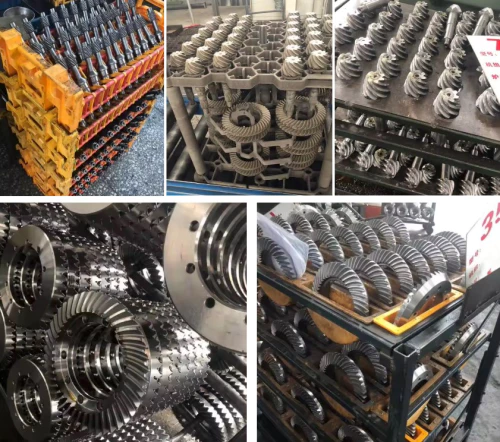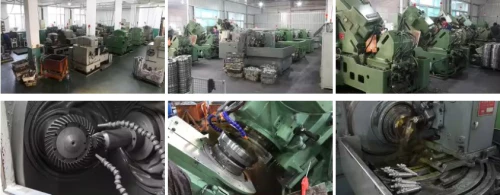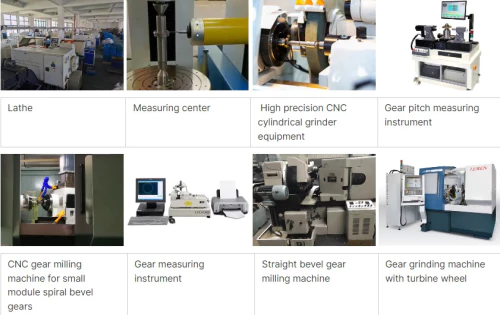Forging Bevel Gear Tooth Strength Calculation Software
Introduction
Forging bevel gears are a type of bevel gears that are manufactured through the forging process. Forging involves shaping metal through the application of localized compressive forces, typically using a die or hammer. In the case of bevel gears, the forging process is used to form the gear teeth and create the desired gear geometry.
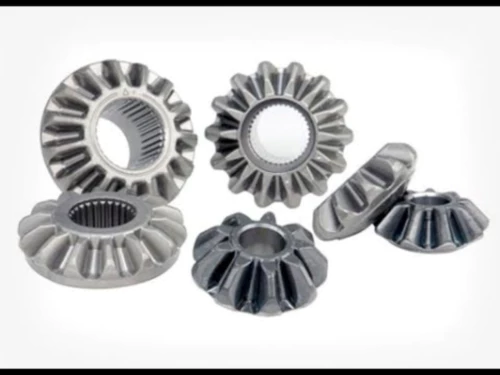
Advantages of Forging Bevel Gears
- High Strength: Forging bevel gears exhibit high strength due to the grain flow and improved metallurgical properties resulting from the forging process.
- Improved Fatigue Resistance: The forging process enhances the fatigue resistance of bevel gears, making them suitable for heavy-duty applications.
- Precise Gear Tooth Geometry: The forging process allows for the precise control of gear tooth geometry, ensuring accurate and efficient gear performance.
- Cost-Effectiveness: Forging bevel gears offer cost-effectiveness in terms of their long service life, reduced maintenance needs, and high resistance to wear and damage.
- Versatility in Material Selection: Forging can be performed on various materials, allowing for the selection of materials with specific properties to meet different application requirements.
- Enhanced Structural Integrity: The forging process eliminates defects, such as porosity and inclusions, which can compromise the structural integrity of bevel gears.
- Tailored Mechanical Properties: Through the forging process, the mechanical properties of bevel gears can be tailored to meet specific application demands.
- Reduced Lead Time: Forging bevel gears can be manufactured quickly, reducing lead time and ensuring timely delivery.
- Environmental Sustainability: Forging is a sustainable manufacturing process that minimizes waste and energy consumption.
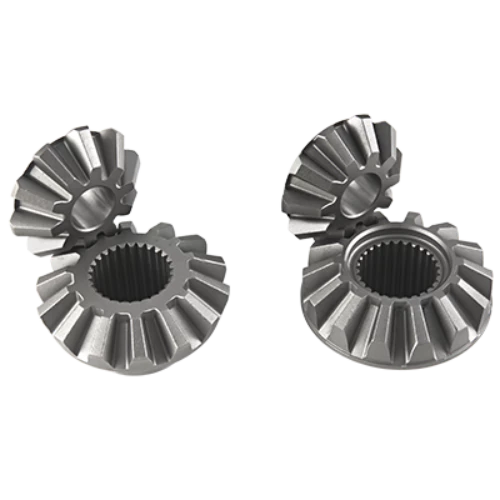
Working Principles
Forging bevel gears operate based on the fundamental principles of gear mechanisms. They consist of two intersecting shafts, each with a conically shaped gear (bevel gear) mounted on it. The teeth of the bevel gears are designed to have a specific tooth profile, such as straight, spiral, or hypoid, depending on the application requirements.
When the input shaft rotates, the engagement of the teeth of the bevel gears causes a transfer of rotational motion and torque to the output shaft. The contact between the mating teeth ensures power transmission while maintaining proper alignment and smooth operation.
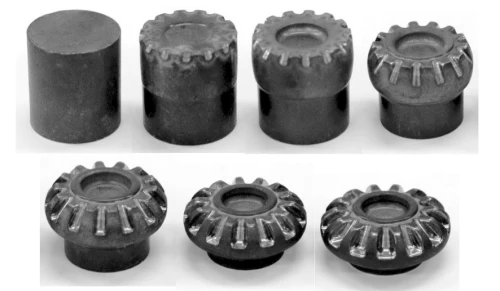
Applications
- Automotive Industry: Forging bevel gears are widely used in automotive transmissions and differential systems, providing reliable and efficient power transmission.
- Industrial Machinery: Forging bevel gears are essential components in various industrial machinery, including machine tools, printing presses, and textile machinery.
- Aerospace and Defense: Forging bevel gears are utilized in aerospace and defense applications, such as aircraft engines, helicopters, and military vehicles.
- Renewable Energy: Forging bevel gears play a crucial role in wind turbines and other renewable energy systems, enabling the conversion of wind or water energy into electrical power.
- Marine and Shipbuilding: Forging bevel gears are used in marine propulsion systems, ensuring efficient power transmission in ships and boats.
- Agricultural Machinery: Forging bevel gears are employed in agricultural machinery, such as tractors and harvesters, facilitating various farming operations.
- Power Generation: Forging bevel gears are utilized in power generation equipment, including generators and turbines, ensuring reliable power production.
- Robotics and Automation: Forging bevel gears are essential components in robotic systems and automated machinery, enabling precise and efficient motion control.
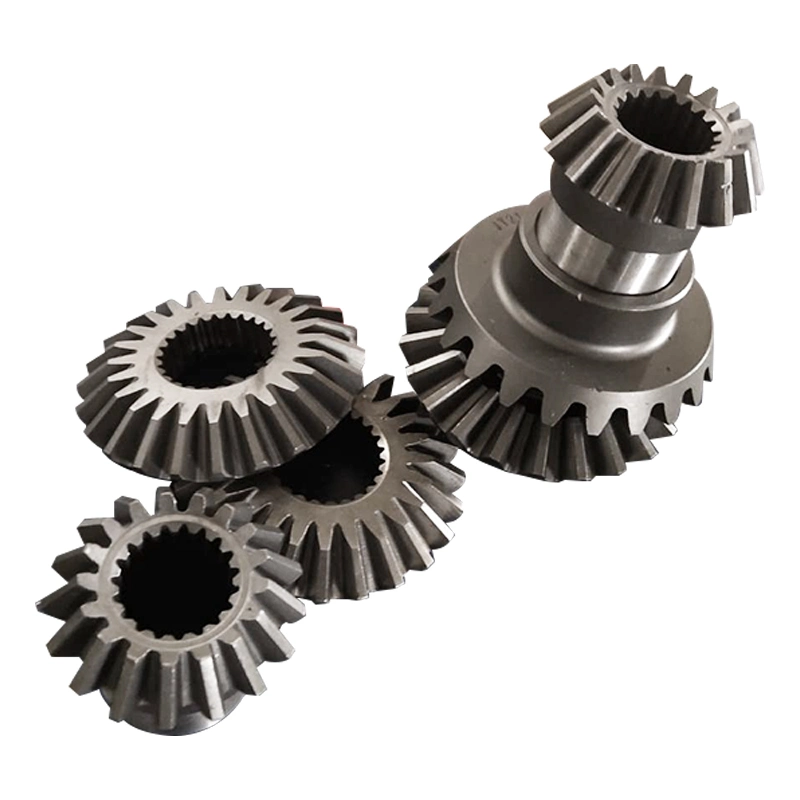
Installation and Maintenance
Installation:
- Proper Alignment: Ensure precise alignment of the bevel gears during installation to prevent premature wear and failure.
- Lubrication: Apply the appropriate lubricant to ensure smooth operation and reduce friction between the gear teeth.
- Mounting Bolts: Use proper mounting bolts and ensure they are tightened to the recommended torque specifications.
- Inspection: Thoroughly inspect the bevel gears after installation for any abnormalities or signs of damage.
Maintenance:
- Lubrication: Regularly lubricate the bevel gears to maintain optimal performance and prevent excessive wear.
- Cleaning: Keep the bevel gears clean and free from debris, ensuring smooth operation and preventing contamination.
- Inspection: Periodically inspect the bevel gears for wear, damage, or any other issues that may affect their performance.
- Replacements: Replace any worn-out or damaged bevel gears promptly to prevent further damage and ensure continued operation.
- Gearbox Maintenance: If the bevel gears are part of a gearbox, follow the manufacturer's guidelines for gearbox maintenance.
- Load Monitoring: Continuously monitor the loads and operating conditions to ensure the bevel gears are not subjected to excessive stress.
- Training and Expertise: Ensure that personnel responsible for the maintenance of bevel gears are properly trained and have the necessary expertise.
- Record-Keeping: Maintain detailed records of the installation, maintenance, and any repairs or replacements performed on the bevel gears.
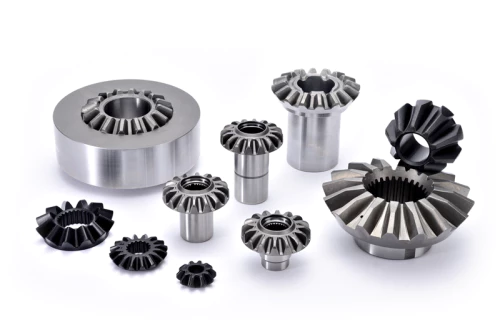
Choosing the Right Forging Bevel Gear
- Application Requirements: Consider the specific application requirements, such as torque, speed, and operating conditions, to select a suitable forging bevel gear.
- Design and Specifications: Ensure that the design and specifications of the forging bevel gear match the requirements of the application.
- Material Selection: Choose the appropriate material for the forging bevel gear based on factors such as strength, durability, and compatibility with the application environment.
- Quality and Reliability: Select a forging bevel gear from a reputable manufacturer known for producing high-quality and reliable gears.
- Load-Carrying Capacity: Determine the load-carrying capacity of the forging bevel gear to ensure it can handle the expected loads without failure.
- Efficiency and Performance: Consider the efficiency and performance characteristics of the forging bevel gear to maximize the overall system performance.
- Customization and Adaptability: Look for forging bevel gears that can be customized or adapted to meet specific application requirements.
- Cost Considerations: Consider both the initial cost and the long-term cost-effectiveness of the forging bevel gear in relation to its performance and durability.
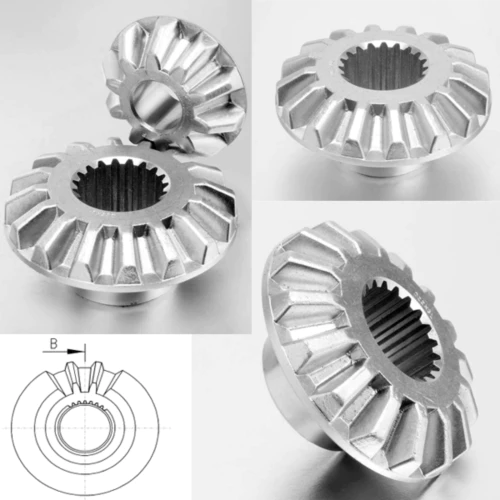
Shaoxing Chaoli: A Leading Manufacturer of Gears
Shaoxing Chaoli is a professional manufacturer of gears in China. We have a wide range of gear products, including forging bevel gears, worm gears, spiral bevel gears, helical gears, spur gears, plastic gears, metric gear racks, and more. Our products are exported to different countries, such as Spain, the Netherlands, the United States, South Korea, Turkey, and Russia.
At Shaoxing Chaoli, we are committed to helping customers develop new products and solve technical and quality problems. We strive to meet the needs of our users with high-quality products, fair prices, and perfect services. Our principles of quality first, timely delivery, and credit first guide our business practices.
In addition to forging bevel gears, we also offer other gear products to cater to various industry needs. We welcome inquiries about customized products and are dedicated to providing tailored solutions.
Shaoxing Chaoli has a team of dedicated engineers and employees, equipped with advanced production monitoring systems and precision measuring instruments. With our strict quality management systems, we ensure the competitiveness and reliability of our products in the industry.
